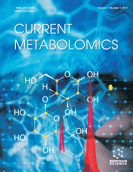Abstract
Polycystic ovary syndrome (PCOS), a common female endocrinopathy, is a complex metabolic syndrome of enhanced weight gain. The goal of this pilot study was to evaluate metabolic differences between normal (n=10) and PCOS (n=10) women via breath carbon isotope ratio, urinary nitrogen and nuclear magnetic resonance (NMR)- determined serum metabolites. Breath carbon stable isotopes measured by cavity ring down spectroscopy (CRDS) indicated diminished (p<0.030) lipid use as a metabolic substrate during overnight fasting in PCOS compared to normal women. Accompanying urinary analyses showed a trending correlation (p<0.057) between overnight total nitrogen and circulating testosterone in PCOS women, alone. Serum analyzed by NMR spectroscopy following overnight, fast and at 2 h following an oral glucose tolerance test showed that a transient elevation in blood glucose levels decreased circulating levels of lipid, glucose and amino acid metabolic intermediates (acetone, 2-oxocaporate, 2-aminobutyrate, pyruvate, formate, and sarcosine) in PCOS women, whereas the 2 h glucose challenge led to increases in the same intermediates in normal women. These pilot data suggest that PCOS-related inflexibility in fasting-related switching between lipid and carbohydrate/protein utilization for carbon metabolism may contribute to enhanced weight gain.
Keywords: Cavity ring down, glucose elevation, lipid metabolism, NMR-metabolomics, polycystic ovary syndrome (PCOS).
 75
75








.jpeg)








